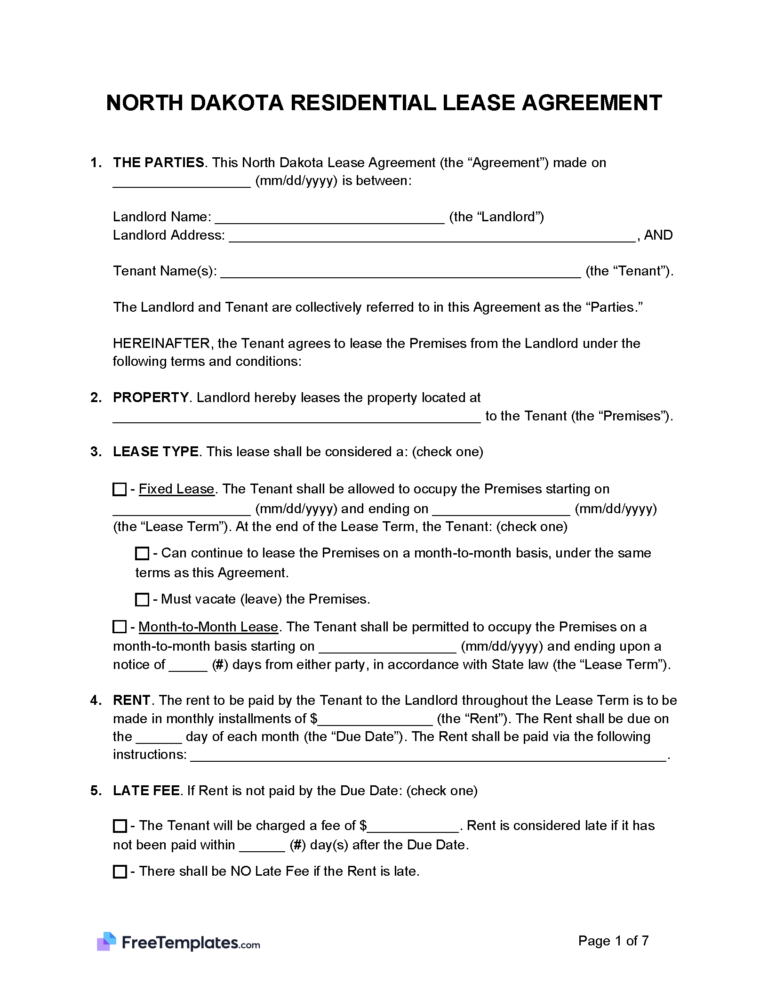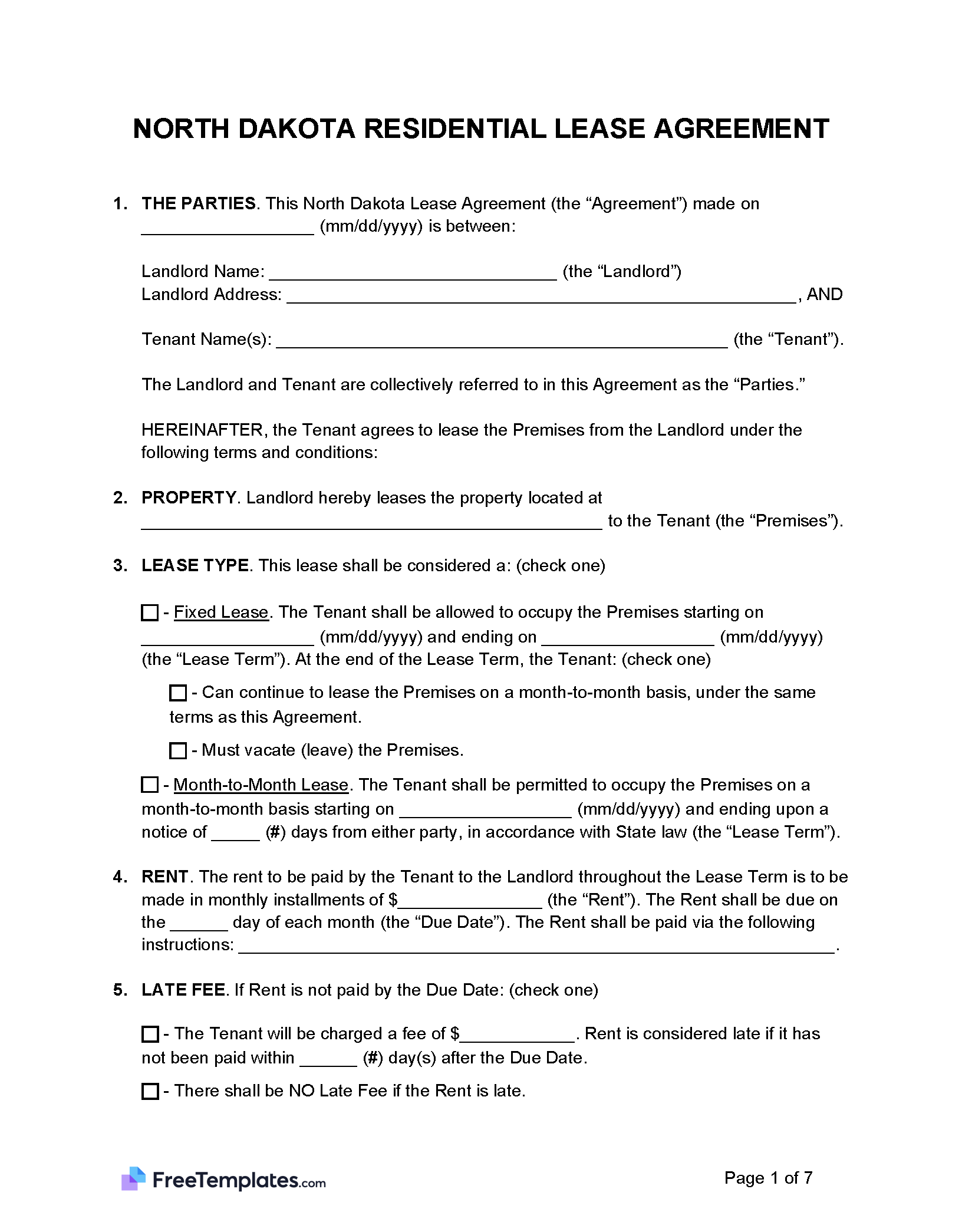By Type (6)
 Standard Lease Agreement – Generally, a 12-month contract that allows a tenant to rent a property from a landlord. Standard Lease Agreement – Generally, a 12-month contract that allows a tenant to rent a property from a landlord.
|
 Commercial Lease Agreement – Used when a business rents a property for retail, office, or industrial space. Commercial Lease Agreement – Used when a business rents a property for retail, office, or industrial space.
|
 Month-to-Month Lease Agreement – This contract renews after each payment and may be voided by the renter or tenant with a 30-day notice. Month-to-Month Lease Agreement – This contract renews after each payment and may be voided by the renter or tenant with a 30-day notice.
|
 Rent-to-Own Agreement – If a landlord would like to sell their property to their renter, they may seek a rent-to-own lease agreement. Rent-to-Own Agreement – If a landlord would like to sell their property to their renter, they may seek a rent-to-own lease agreement.
|
 Roommate Agreement – This is used for two roommates sharing a leased space to outline the duties and responsibilities required to live together. Roommate Agreement – This is used for two roommates sharing a leased space to outline the duties and responsibilities required to live together.
|
 Sublease Agreement – A tenant may re-rent out some or all of their rented space after seeking landlord approval. Sublease Agreement – A tenant may re-rent out some or all of their rented space after seeking landlord approval.
|
Disclosures (2)
Lead-Based Paint Disclosure – Toxic lead may exist in any home built in 1978 or earlier in North Dakota. The landlord must disclose the lead-based paint pamphlet to any renter leasing a house built before that date. (EPA/HUD Fact Sheet)
Property Conditions Disclosure – Both landlord and tenant must sign a conditions disclosure regarding the state of the unit at the start of the lease. (§ 47-16-07.2)
Security Deposit
Maximum Amount—A landlord may charge up to one month’s rent for a security deposit (§ 47-16-07.1(1)) unless the tenant is a convicted felon (§ 47-16-07.1(1)(a)) or has a previous lease violation (§ 47-16-07.1(1)(b)), in which case they may be charged up to two months’ rent.
Returning to Tenant – The security deposit must be returned to the departing tenant within 30 days of the lease end. (§ 47-16-07.1(3)(c))
- Itemized List – Yes, a landlord’s itemized list is required if any money is deducted from the security deposit to fix or repair any damages the tenant made. (§ 47-16-07.1(3)(c))
Pet Security Deposit – For non-service animals, the landlord may charge a tenant up to $2,500 or two months rent, whichever is greater. (§ 47-16-07.1(2))
Collecting Interest – The landlord must keep the security deposit funds in an interest-bearing, federally insured-account. (§ 47-16-07.1(1))
Landlord Access
General Access – The landlord is required to give the tenant written notice if they wish to gain access to the rental property for a reasonable or legitimate reason. (§ 47-16-07.3(2))
Emergency Access – If a landlord believes the property has been abandoned or if the tenant violates the lease agreement, they may gain emergency access to the unit. (§ 47-16-07.3(1))
Paying Rent
Grace Period – There is no grace period for late rent payments in North Dakota. Failure to pay on time may result in a 3-day notice to quit or pay from the landlord. (§ 47-32-01(4))
Maximum Late Fee – There is no maximum penalty. The landlord may charge the tenant for late rent; however, it must be stated and agreed to in the original lease agreement.
Returned Checks (NSF) – Writing a bad rent check may result in a $40 fine imposed by the landlord. (§ 6-08-16(2)(a))
Withholding Rent – If a problem or repair is needed in the rental unit, the tenant may fix the issue and deduct the repair cost from the monthly rent only after notifying the landlord. (§ 47-16-13(1))
Reasons for Eviction (4)
Leaving Before the End Date – If a tenant decides to abandon their rental unit, they are still liable to pay until the end of the contract. If left abandoned, the landlord must attempt to re-rent the unit to another tenant. (§ 47-16-13.5)
Lockouts – A landlord may not lock their tenant out of the property or cut utilities to attempt to remove them. (North Dakota Courts: Eviction for Landlords)
Non-Compliance – Violating or not complying with the terms of the rental agreement may result in being served a 3-day notice to quit or comply. (§§ 47-32-01(8), 47-32-02)
Non-Payment of Rent – Failure to pay rent on time may result in a 3-day notice to quit of pay served by the landlord. (§§ 47-32-01(4), 47-32-02)

